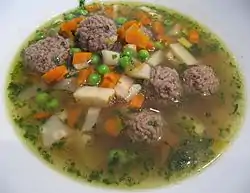Eintopf
Eintopf (lit.: one-pot) is a traditional type of German stew which can consist of a great number of ingredients. Technically, the term refers to a way of cooking the ingredients in one pot, not to any specific recipe.
 A typical Eintopf: vegetable soup with small meat balls | |
| Type | Stew |
|---|---|
| Place of origin | Germany |
Many different regional specialty recipes for Eintopf are known in Germany; for example, the Kassel area has a type called Lumben un Fleeh in the local dialect (Standard German: Lumpen und Flöhe - rags and fleas), which is quite similar to Irish stew.
Preparation
Eintopf contains 3–4 basic ingredients:
- broth
- (green) vegetables
- a carbohydrate-rich component, usually potatoes or pulses, less often noodles or rice
- (optional) meat or sausage.
Beef stock, chicken broth or vegetable stock are often used as a foundation, to which the other ingredients are gradually added. These are usually cooked until soft but not mushy, resulting on average in a less homogenous consistency than an English-type stew or a gumbo, somewhat between those and the Japanese nabemono. There are thicker German stews like Hasenpfeffer or Labskaus; these would not usually be considered an Eintopf, though the technical difference is minor (longer cooking times and fewer vegetables).
Most commonly, ingredients include pork, beef or chicken along with a variety of vegetables such as carrots, peas, beans, lentil, potatoes, cauliflower, kale, celery, onions, asparagus, or garlic. Fish is also sometimes used. To bring out the flavor of these ingredients, kitchen herbs like parsley, lovage or chive may be added, as well as salt, pepper and other spices.
History
As part of the Eintopfsonntag campaign, from 1933 the Nazi party made a midday Sunday eintopf obligatory on some days:[1] in particular as part of the Winterhilfe, the first Sunday of the month from October until March was declared Eintopfsonntag.
Examples
- Gaisburger Marsch
- German pea soup (Erbsensuppe)
- Linseneintopf ("lentil stew")
- Steckrübeneintopf (based on rutabaga)
- Moppelkotze
- Pichelsteiner
See also
References
- Frost, Natasha. "The Forgotten Nazi History of 'One-Pot Meals'". Atlas Obscura. Retrieved 10 July 2018.